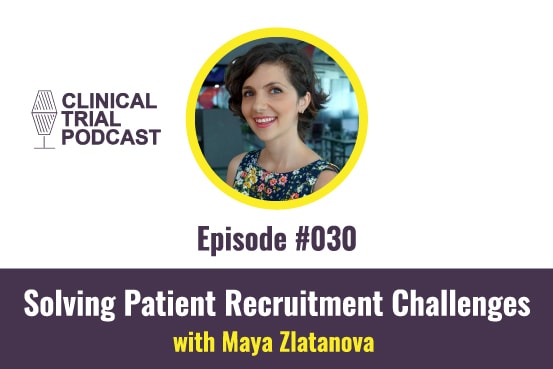I’m always excited to speak with software entrepreneurs in clinical research and this episode is no exception.
Our guest on today’s show is Maya Zlatanova, CEO of FindMeCure.
Maya and her team are creating a “google” for clinical trials.
- She is on a mission to make it easy for patients to find ongoing clinical trials
- She wants to solve patient recruitment challenges enabling patients and doctors to connect with each other
- She believes in the power of stories, not just facts, something unheard of (but much needed) in clinical research.
FindMeCure is dedicated to simplifying the patients’ journey while volunteering for a clinical trial while helping the industry plan their trials with the full picture of country capacity, sites’ experience and patients needs and journey.
Maya is a healthtech entrepreneur, clinical research expert, and pharma industry speaker with over 15 years of global experience in clinical research regulations, patient recruitment, and engagement, clinical trial feasibility, and operations.
Maya’s strongest skill is empathy.
Her principles in life are to be trustworthy, care for other people and give first.
She also cherishes her never-ending curiosity about how life and the universe work, how to improve ourselves and our environment.
Please join me in welcoming Maya Zlatanova on the Clinical Trial Podcast.
[02:25] About Maya’s company FindMeCure, Maya’s experience working on clinical research software for the British government and first online GCP training
[04:154] Maya’s sister was diagnosed with an eating disorder and struggled to find treatment. This let to Maya looking at clinical trials from a patient perspective
[06:06] Creating a global platform for patients to find out about alternative treatments in clinical trial setting
[08:29] Connecting patients in one country with clinical trials in another country
[09:55] Challenges for patients include:
- Human factors such as need to be close to family
- Traveling long distances to participate in clinical trials
- Being treated by different doctor (trial investigator) than their primary physician
[13:01] Patient recruitment process can benefit from change. Currently we first select sites and then bring patients into these sites.
[14:26] We need to break things to innovate
[15:25] In an ideal world, we would have a centralized electronic health record, we know where patients are, patients are monitored with telehealth solutions, central site that is leading other sites
[16:55] Everyone wants to go to the experienced sites
[19:43] Hybrid clinical trials
[20:28] Need to support sites and investigators by questioning what sites should and shouldn’t do
[24:05] convincing decision makers to select sites in other geographies using financial metrics
[28:03] Language is not an obstacle at most sites. Ethical considerations can pose an issue.
- CRO with local office
- Site Management Organization (SMO)
- Own CRA networks
[32:00] Adoption of technology in clinical research such as sites being open to new remote solutions
[33:55] Whatever works for clinical research will work for the healthcare sector
[34:03] ACRES helping sites getting accredited and certified if they follow certain standards for clinical trials
[36:32] GCP is the only standard in clinical research. For example, it is not sufficient for patient centric trials
[38:02] Need to align on initiatives such as patient engagement guidelines in EU and USA
[39:45] Empathy is a feeling for people and imagining yourself in their shoes. Being open to the fact that you could be wrong. Listening to people, hearing you are wrong, and converting to the right thing
[42:42] Maya’s secret weapon is speaking with different people with different backgrounds to learn and grow
Resources mentioned:
Society of Clinical Research Sites (SCRS)
Association of Clinical Research Professionals (ACRP)
Food and Drug Administration (FDA)
Alliance for Clinical Research Excellence and Safety (ACRES)
TransCelerate – Pharmaceutical Research and Development







